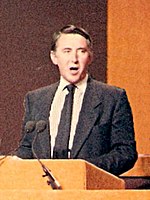| |||||||||||||||||||||||||||||||||||||||||||||||||||||||||||||||||||||||||
All 38 Welsh seats to the House of Commons | |||||||||||||||||||||||||||||||||||||||||||||||||||||||||||||||||||||||||
|---|---|---|---|---|---|---|---|---|---|---|---|---|---|---|---|---|---|---|---|---|---|---|---|---|---|---|---|---|---|---|---|---|---|---|---|---|---|---|---|---|---|---|---|---|---|---|---|---|---|---|---|---|---|---|---|---|---|---|---|---|---|---|---|---|---|---|---|---|---|---|---|---|---|
| |||||||||||||||||||||||||||||||||||||||||||||||||||||||||||||||||||||||||
The 1987 United Kingdom general election in Wales took place on 11th June, 1987 for all 38 Welsh seats in the House of Commons. The Labour Party again won a majority of Welsh MPs, gaining four seats for a total of 24 out of 38. The governing Conservatives lost six seats, with the SDP-Liberal Alliance and Plaid Cymru gaining one each.
Contents
Despite Labour winning the most votes in Wales, across the UK the Conservatives won a landslide majority and continued in office for a third term. [1]




